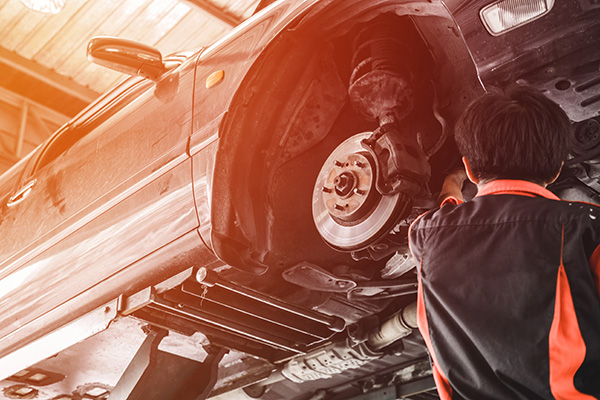
Brake failure is a situation every driver hopes never to face, yet it demands clear thinking and fast, informed action. When you press the brake pedal and nothing happens, panic is a natural response. But knowing what to do in the moment and how to prevent it from happening in the first place can make all the difference between a close call and a serious accident.
Though today’s braking systems are highly dependable, no vehicle is immune to mechanical failure. Understanding what causes brakes to fail, taking the necessary steps if it happens to you, and reducing your risk will help you stay safer on the road.
How Your Brakes Work
Your car’s braking system relies on hydraulic pressure to function. When you press the brake pedal, that force travels through a network of brake fluid-filled lines to calipers or wheel cylinders. These, in turn, press brake pads or shoes against rotors or drums, generating the friction needed to slow or stop your vehicle.
If any part of this system malfunctions—due to fluid loss, air in the lines, overheated components, or mechanical wear—braking power can be reduced or lost altogether.
What to Do When the Brakes Fail
If your brakes suddenly stop responding while you’re driving, staying calm is critical. The first thing to try is pumping the brake pedal quickly. This may help build up enough pressure to re-engage the brakes, especially if the problem involves a fluid leak or air in the lines.
If that doesn’t work, begin to slow the car by shifting into a lower gear. Whether you drive a manual or automatic transmission, downshifting uses engine resistance to reduce speed without relying on the brakes. At the same time, begin applying the emergency or parking brake—gently and gradually. Pulling it suddenly can lock up the rear wheels, especially at higher speeds, and cause the vehicle to skid. A steady application can slow the car in a more controlled manner.
As you attempt to stop, keep your hands firmly on the wheel and scan the road for a safe area to steer into. Look for wide shoulders, grassy areas, or even an uphill incline to help bring your vehicle to a stop. Use your hazard lights and horn to alert other drivers that there is an issue.
Once you’ve stopped the vehicle, turn off the engine and call for roadside assistance. Don’t attempt to drive the car again until the braking system has been professionally inspected and repaired.
Why Brakes Fail
Brake failure typically doesn’t happen without cause. One of the most common reasons is a brake fluid leak. When the system loses fluid, it also loses the hydraulic pressure needed to operate the brakes. Another possibility is overheated brakes, which can occur during long downhill drives or heavy traffic in hot weather. Excessive heat can cause brake components to lose effectiveness or even cause the brake fluid to boil, reducing its ability to transmit pressure.
Mechanical wear is another factor. Severely worn brake pads can expose metal parts, reducing friction and making braking much less effective. A failed master cylinder, which is responsible for distributing brake fluid, can also render the entire system inoperable.
In some cases, contaminated or old brake fluid can absorb moisture over time. This reduces its boiling point and makes the system more vulnerable during high-heat situations.
Warning Signs to Watch For
The good news is that complete brake failure is rare—and usually preceded by warning signs. A spongy brake pedal that sinks too far toward the floor is often a clue that something is wrong. Grinding or squealing sounds when braking may indicate that your pads are worn and need replacement. A car that pulls to one side during braking or takes longer to stop than usual may also be developing brake issues. Brake warning lights on your dashboard are another key indicator that your system needs attention.
If you notice any of these signs, don’t wait. Early inspection can catch problems before they turn into dangerous failures.
Preventive Maintenance Is Key
Routine brake inspections are one of the most effective ways to prevent emergencies. Technicians can check the thickness of your pads, inspect the rotors for wear, look for fluid leaks, and test the integrity of your entire braking system. Regular brake fluid flushes are also important, especially in humid climates where moisture contamination is more common.
Staying proactive protects your safety and also prevents more expensive repairs down the line.
Protect Yourself With Help From Mancinelli’s Auto Repair Center in Denver, CO
At Mancinelli’s Auto Repair Center in Denver, CO, we believe that brake safety begins with awareness and regular maintenance. If you’ve noticed soft braking, odd noises, or anything that feels off, don’t wait for the problem to escalate. Our experienced team will perform a detailed brake inspection and let you know exactly what needs attention, from fluid levels to pads and beyond.
If you’ve ever wondered what you’d do during a brake emergency, let’s make sure you never have to find out. Schedule your brake check with Mancinelli’s today and keep your vehicle prepared for whatever lies ahead.